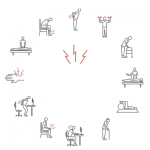The Need for Replication
The new opioid prescribing recommendations and clinic workflow have resulted in a multi-disciplinary and clinic-wide participation in the safe prescribing and monitoring of opioids for rheumatology patients. Given the success of this program, these interventions need to be replicated in other primary care and specialty clinics.
Possibilities for future interventions include naloxone education, urine drug screen integration into clinic protocols and re-education of staff to reinforce consistency. Also, given the evolving role of the clinic pharmacist, continued education regarding multi-disciplinary roles would be beneficial.
The workflow changes and new approaches to opioid medication management in the Division of Rheumatology is a good first step. Although it is unclear if the decreasing number of opioid prescriptions in our rheumatology clinic will lead to better pain control, we will continue to strive for increased patient safety and better quality of care while balancing the known risks of opioid medications.
These strategies also need to be extended throughout the community and the Duke University Health System to include other specialties that prescribe and manage chronic pain conditions.
 Lisa Carnago, FNP-C, MSN, BSN, RN, is a nurse practitioner in the Division of Rheumatology & Immunology at Duke University Medical Center, N.C.
Lisa Carnago, FNP-C, MSN, BSN, RN, is a nurse practitioner in the Division of Rheumatology & Immunology at Duke University Medical Center, N.C.
 Jenelle Hall, PharmD, BCACP, CPP, is a clinical pharmacist at Duke University Medical Center.
Jenelle Hall, PharmD, BCACP, CPP, is a clinical pharmacist at Duke University Medical Center.
 Stephanie Puryear, RMA, is a registered medical assistant in the Division of Rheumatology & Immunology at Duke University Medical Center.
Stephanie Puryear, RMA, is a registered medical assistant in the Division of Rheumatology & Immunology at Duke University Medical Center.
References
- Overdose death rates. National Institute on Drug Abuse. 2019 Jan.
- Kolodny A, Frieden TR. Ten steps the federal government should take now to reverse the opioid addiction epidemic. JAMA. 2017 Oct;318(16):1537–1538.


